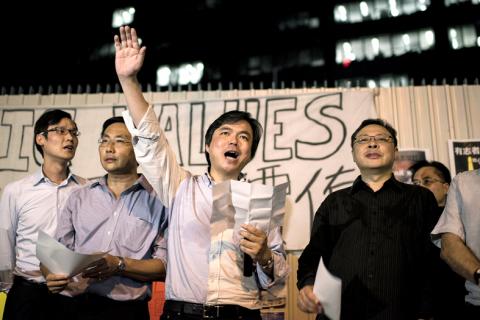China warned against foreign meddling in Hong Kong’s politics yesterday, ahead of an expected announcement to recommend highly contentious restrictions on the first direct elections for the leader of the Chinese-controlled financial hub.
An article in the People’s Daily, the Chinese Communist Party’s (CCP) flagship newspaper, said that some people in the former British colony were colluding with outside forces to interfere in Hong Kong’s governance.
“Not only are they undermining Hong Kong’s stability and development, but they’re also attempting to turn Hong Kong into a bridgehead for subverting and infiltrating the Chinese mainland... This can absolutely not be permitted,” the article said, citing an unidentified official in the Chinese Ministry of Foreign Affairs’ department for Hong Kong, Macau and Taiwan.

Photo: AFP
The article said that as a special administrative region of China, Hong Kong’s affairs are entirely a Chinese internal matter.
China would refute and make “solemn representations” in response to statements and actions by foreign forces and demand that they “cease meddling in Hong Kong’s affairs and Chinese internal political matters by any means,” the article said.
The article did not identify any individuals or groups, although the UK and the US have both been vocal about their hopes for genuine democratic reform in Hong Kong.
The warning appeared as China’s legislature was expected to announce today that an elite pro-Beijing body must vet candidates for the territory’s leader starting from 2017 — setting up a showdown with pro-democracy groups who want Hong Kongers to be able to freely nominate candidates.
Hong Kong newspapers have reported that the Chinese Standing Committee of the National People’s Congress is to recommend that voters choose from up to three candidates named by a nominating body, while the public gets no say.
That would resemble the current system under which a 1,200-member panel stacked with mostly pro-Beijing elites gets to pick the leader.
Democracy activists are threatening to respond with a mass sit-in which would paralyze the financial district that is the symbolic heart of the city. Student leaders are also considering a walkout of university classes next month.
Since being handed back from the UK in 1997, Hong Kong has retained a high degree of legal, economic and political autonomy.
However, there are growing concerns among many of the territory’s 7 million people that Beijing wishes to insert itself more strongly into Hong Kong’s affairs, particularly in ensuring that its leadership remains beholden to the CCP.

Seventy percent of middle and elementary schools now conduct English classes entirely in English, the Ministry of Education said, as it encourages schools nationwide to adopt this practice Minister of Education (MOE) Cheng Ying-yao (鄭英耀) is scheduled to present a report on the government’s bilingual education policy to the Legislative Yuan’s Education and Culture Committee today. The report would outline strategies aimed at expanding access to education, reducing regional disparities and improving talent cultivation. Implementation of bilingual education policies has varied across local governments, occasionally drawing public criticism. For example, some schools have required teachers of non-English subjects to pass English proficiency

‘FORM OF PROTEST’: The German Institute Taipei said it was ‘shocked’ to see Nazi symbolism used in connection with political aims as it condemned the incident Sung Chien-liang (宋建樑), who led efforts to recall Democratic Progressive Party (DPP) Legislator Lee Kun-cheng (李坤城), was released on bail of NT$80,000 yesterday amid an outcry over a Nazi armband he wore to questioning the night before. Sung arrived at the New Taipei City District Prosecutors’ Office for questioning in a recall petition forgery case on Tuesday night wearing a red armband bearing a swastika, carrying a copy of Adolf Hitler’s Mein Kampf and giving a Nazi salute. Sung left the building at 1:15am without the armband and apparently covering the book with a coat. This is a serious international scandal and Chinese

TRADE: The premier pledged safeguards on ‘Made in Taiwan’ labeling, anti-dumping measures and stricter export controls to strengthen its position in trade talks Products labeled “made in Taiwan” must be genuinely made in Taiwan, Premier Cho Jung-tai (卓榮泰) said yesterday, vowing to enforce strict safeguards against “origin laundering” and initiate anti-dumping investigations to prevent China dumping its products in Taiwan. Cho made the remarks in a discussion session with representatives from industries in Kaohsiung. In response to the US government’s recent announcement of “reciprocal” tariffs on its trading partners, President William Lai (賴清德) and Cho last week began a series of consultations with industry leaders nationwide to gather feedback and address concerns. Taiwanese and US officials held a videoconference on Friday evening to discuss the

PERSONAL DATA: The implicated KMT members allegedly compiled their petitions by copying names from party lists without the consent of the people concerned Judicial authorities searched six locations yesterday and questioned six people, including one elderly Chinese Nationalist Party (KMT) member and five KMT Youth League associates, about alleged signature forgery and fraud relating to their recall efforts against two Democratic Progressive Party (DPP) legislators. After launching a probe into alleged signature forgery and related fraud in the KMT’s recall effort, prosecutors received a number of complaints, including about one petition that had 1,748 signatures of voters whose family members said they had already passed away, and also voters who said they did not approve the use of their name, Taipei Deputy Chief Prosecutor